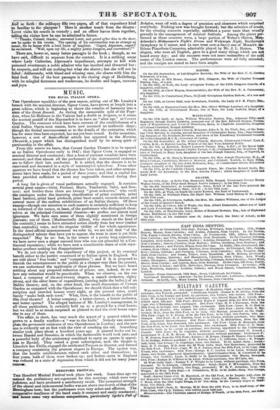MU SIC.
THE RIVAL ITALIAN OPERA.
THE Operahouse squabbles of the past season, arising out of Mr. Lumley's breach with his musical director, Signor Costa, have grown at length into a great schism, which is beginning to throw the votaries of harmony into a state of the direst discord. As during the memorable split of the Pope- dom, when his Holiness in the Vatican had a doubk at Avignon, so it seems the musical pontiff of the Haymarket is to have an "alter ego" at Covent Garden. The rumours which have been current of the establishment of a rival Italian Opera next season, have now assumed an authentic shape; though the formal announcement as to the details of the enterprise, which has for some time been expected, has not yet been issued. In the meantime, however, a sort of demi-official article has appeared in the Morning Chronicle, a paper which has distinguished itself by its strong spirit of partisanship in the affair.
From this source we learn, that Covent Garden Theatre is to be opened as an Italian Operahouse early in 1847; that Signor Costa is engaged as musical director and conductor; that a host of eminent vocalists have been seeured; and that almost all the performers of the instrumental orchestra are to follow their late conductor. It is added, that the theatre is to be renovated and decorated in a style of unexampled splendour. From other quarters we have heard that the theatre has been taken, and other arrange- ments have been made, for a period of three years; and that a capital has been provided sufficient to meet any supposable demand during that period.
A long list is given of vocal performers actually engaged. It contains
several great names—Grisi, Persiani, Mario, Tambnrini, Salvi, and Ron- coni; and besides these there are twenty "great unknown," who swell the catalogue under the imposing classification of primi contralti, primi bassi baritoni, primi bassi profoncli, primi bassi comici, seconde donne, and several more of the endless subdivisions of an Italian theatre. Of these twenty—though our attention to such matters is certainly sufficient to keep us informed of the names, at least, of the performers who distinguish them. selves at the principal Continental theatres—we profess our almost total ignorance. We have seen some of them slightly mentioned in foreign journals; one of them (Mademoiselle Alboni, who stands at the head of the contralti,) seems to have attracted notice chiefly from her tenor (rather than contralto) voice, and the singular virility of her whole appearance. In the demi-official announcement we refer to, we are told that "of the distinguished talents that have yet to appear, the treat in store is yet little suspected." May be so: but, in the course of a pretty long experience, we have never seen a singer succeed here who was not preceded by a Con- tinental reputation; while we have seen a considerable share of such repu- tation produce nothing but disappointment.
We do not clearly see the expediency of this project, or its eventual benefit either to the parties concerned or to Italian opera in England. We are told about " free trade," and "competition"; and if it is proposed to furnish the entertainment to the public at a cheaper rate than the present, we can understand the application of these phrases. But we have heard nothing about any proposed reduction of prices; nor, indeed, do we see how any reduction would be practicable. When we observe, on the one hand, a company of six-and-twenty singers, a superb orchestra, eighty strong, and the other items of expenditure, (setting aside the ballet,) of an Whin theatre; and, on the other hand, the small dimensions of Covent Garden as compared with the Operahouse; we should think that a full sub- scription and crowded houses every night, at the present rates, could barely "make both ends meet." What, then, is the benefit to the public of this rival theatre? A better company, a better chorus, a better orchestra, and better operas? The alleged badness of Mr. Lumley's management, in all these particulars, is certainly held up as a ground for a rival house; but we shall be as much surprised as pleased to find the rival house supe- rior in any of them.
The affair, in short, has very much the aspect of a quarrel which has grown to a deadly conflict—a "war to the knife." Nobody can contem- plate the permanent existence of two Operahouses in London; and the new one is evidently set on foot with the view of crushing the old. Something similar took place about a hundred years ago. A quarrel broke out be- tween Handel and Senesino, in which the fashionable world took part; and a powerful body of the aristocracy combined to carry on operas in opposi- tion to Handel. They raised a great subscription, took the theatre in Lincoln's Inn Fields, engaged the celebrated Porpora as director, and formed a company containing the greatest singers in Europe. The upshot was, that the hostile establishments ruined each other and themselves: in four years, both of them were broken up; and Italian opera in England was reduced to a state of depression from which it did not for many years recover.


























 Previous page
Previous page